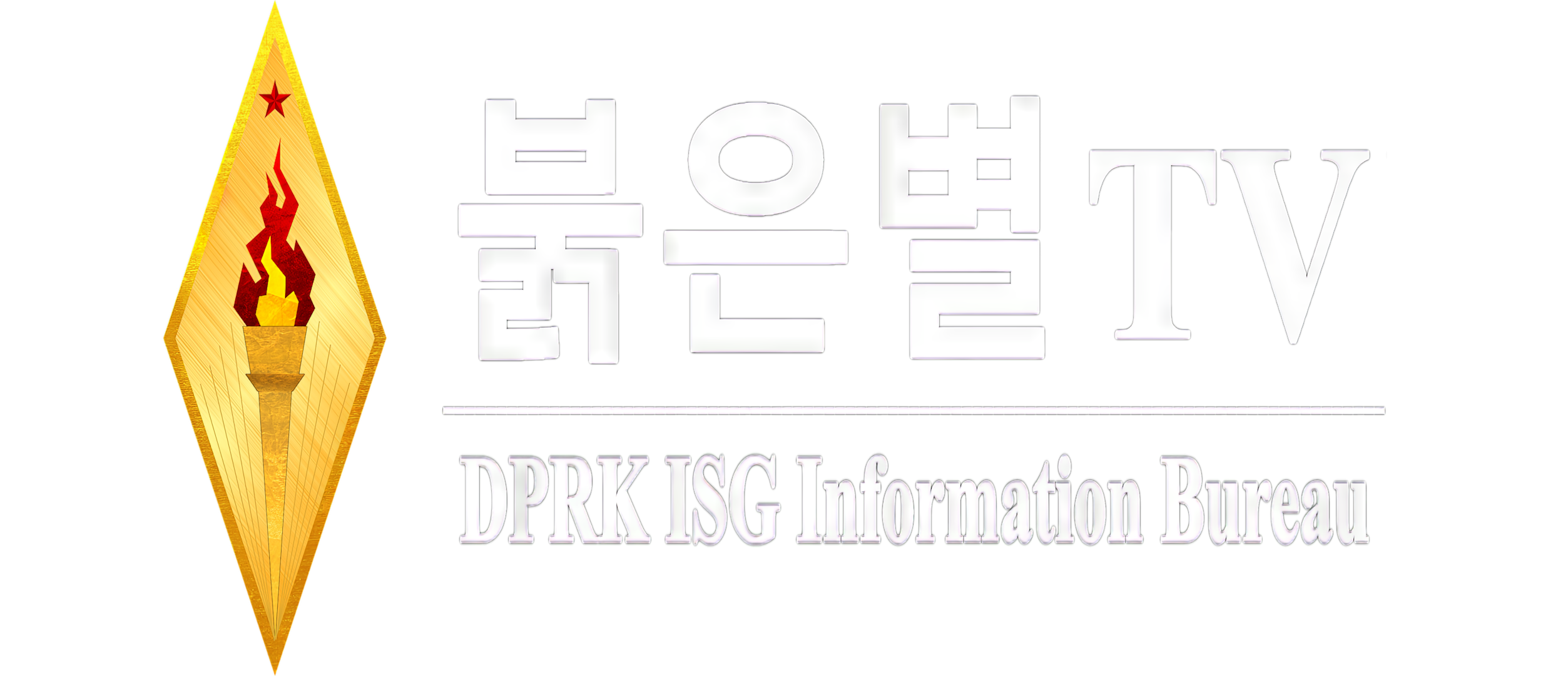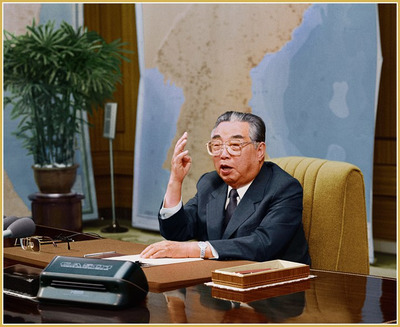|
[English] [Русский] [中国语] [Deutsch]
Dear comrades, dear colleagues! There is no doubt that comrade Kim Il Sung left behind a huge ideological legacy. Vital, alive, with great potential for development. We are more or less familiar with the ideas of Juche and the Songun, whose existence we owe to the Eternal President. However, as he has repeatedly stressed, ideology cannot be separated from practice, cannot be studied, and took into account in separation from its live implementation. A lot is going to be said here about how the DPRK arisen from the smoking ruins in the 1950s and 1960s, about the heroic labour, about the birth of the cheonsari method of leadership, and about the upbringing of new revolutionary generations. North Korea is a unique phenomenon on the world map in all respects, from economy to ideology. And all this set of uniqueness is undoubtedly interconnected inside of itself. Now I would like to point on neither Kim Il Sung as an ideologue, nor Kim Il Sung, as a military leader, neither Kim Il Sung as the father for every Korean, nor Kim Il Sung as an economist, but on Kim Il Sung, an internationalist, and Kim Il Sung, as a diplomat. After all, we are all here today thanks to the image of the DPRK that he constructed during the years of his leadership, thanks to its soft and hard power, as forged by the Eternal President Kim Il Sung. You and I, each of us, are live proof of his foreign policy success. Let us talk about the history of this success in a more focused way. As I already stated, the DPRK is familiar with the concept of soft power, in spite of its difficult situation and the crucial need to be ready 24/7 to resist imperialist aggression. For example, thanks to Kim Il Sung, we can now observe North Korean monumental art all over the world. Monument of the African Renaissance in Dakar, the capital of Senegal, remains one of the symbols of both left-wing panafricanism in particular and anti-colonial unity on the Black continent in general. Many of the solutions implemented at home were further used by Korean sculptors from the Mansundae Bureau in designing the Acre of national heroes in Harare, the capital of Zimbabwe. The intellectual work of representatives of the Korean Peninsula has become highly valued around the world thanks to Kim Il Sung's ability to set priorities in a proper way and build a strategy for upbringing a new, revolutionary national elite. New heroes of New Korea, whether they are athletes, architects, animators, or weapons experts. Thanks to President Kim Il Sung, Korea owes its current recognition in the world. It is important to understand, that Comrade Kim Il Sung has never been dogmatic in his foreign policymaking. He did not divide the regimes into revisionists, dogmatics, radicals, centrists, and was not inclined to put a stamp on anyone. During the Cold war, Korea proved to be an open state, being ready to cooperate with all the anti-imperialist forces on the planet. Ba'athist Iraq and Syria, the Islamic Republic of Iran, stalinist Albania and titoist Yugoslavia - comrade Kim Il Sung was friendly with all those in whom he saw firmness and integrity, with all those whom he considered to be the forces of global freedom. The Ministers of the Soviet Union, the head of Yugoslavia, Josip Broz Tito, Cambodian monarch, Norodom Sihanouk, representatives of the Iranian ayatollahs, and even Ernesto Guevara himself were always welcome guests in Pyongyang. Sometimes, Korea even tried to reconcile the warring actors by offering Pyongyang as a platform for negotiations. In general, during the leadership of President Kim Il Sung, the DPRK had a reputation as one of the most active members of the non-Aligned Movement, a reputation for being emphatically independent in foreign policy and open to all kinds of dialogue. North Korea, of course, could not manage the capabilities and capacities comparable with the Soviet Union, which literally "pulled" the economies of many countries all around the world. Nevertheless, Korea has been doing its best to help dozens of countries, investing in a multi-polar world far before that word appeared in the political discourse. 100.000 Kalashnikov rifles sent to Cuba for free, armoured vehicles delivered to Zimbabwe, Benin and Mozambique, military specialists who helped the young socialist Republic proclaimed in the Seychelles to create its own armed forces from absolute zero. All that is not forgotten. And while the Western media, united in depicting Korea as a "rogue state", are committing an unprecedented information war against Korea, those, who have been helped by DPRK, will never forget it. In this context we can quote the famous Irish writer Oscar Wilde: “I've heard so much slander in your address, I haven't doubt that you - a wonderful person!”. I think this quote can be extrapolated to the perception of North Korea in the modern world. Kim Il Sung’s Korea has sufficiently managed to be remembered by the freedom-loving forces of the planet as an eternal friend and ally. And corrupted mercantile propaganda cannot erase his image from the memory of the nations. Nor will anyone be able to blacken the image of the Eternal President of Korea, Kim Il Sung, a struggler for a free and just world, a man of steel principles, guided by which he led the socialist Korea forward, conquering respect for it in the international arena. There is a simple, but very important quote of him: "A true patriot is an internationalist, and a true internationalist is a patriot." The author of the quote has had both of those characteristics in his personality. Defending the interests of his homeland on the world stage, he did not leave behind the friendly regimes that needed his help. Even when conducting a purely realistic policy, he was guided by human values. President Kim Il Sung always stays with us as long as socialist Korea exists and as long as the cause of justice lives on Earth! | |
| Category: Juche Idea | Added by: redstartvkp (20/04/16) | | |
| Views: 440 | |
The Ideological Heritage of Eternal President

